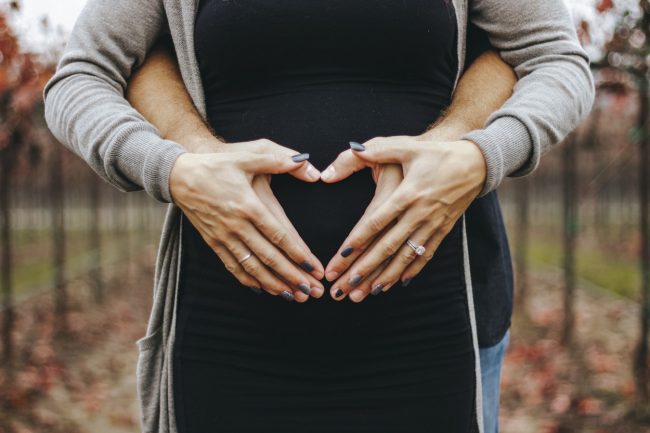
Prevention
Visiting a dentist while pregnant is highly recommended for your own wellbeing and that of your unborn child. Routine dental treatment is safe during pregnancy, although some procedures or medication should be avoided in the first 3 months, so be sure to tell your dentist you are pregnant. Many treatments are elective (tooth whitening etc.) and postponed until after pregnancy, there is care that a pregnant woman needs and sometimes treatment cannot wait, but can be done with minimal risk. .
Myths
There is a long-standing myth that a woman looses a tooth for every child she has. Of course this is not the case, but circumstances and changes in the mouth make it appear so. The myth goes on to claim that the foetus draws calcium directly from the mother’s teeth and results in weakened teeth that decay and may be lost. In fact the mother’s diet (and nutritional supplements) give the developing foetus all the calcium he or she needs to develop. Increased cavities are the result of many factors such as an increase in snacking and poor oral hygiene.
Intraoral Changes
Starting about the second month of and continuing for the rest of the pregnancy, hormone changes affect the gums or gingivae. The gingivae are far more susceptible to irritation from plaque (soft) or calculus (hard) deposits on the teeth. An exaggerated inflammatory response can result in mild redness or gingivitis, to swelling of the gingivae between the teeth. These swellings are painless, but do bleed easily. Most pregnant women experience some form of inflamed gums even with good dental hygiene. Additionally, looseness of the teeth may be noticed, especially in the third trimester. These gingival changes usually reverse after the baby is born.
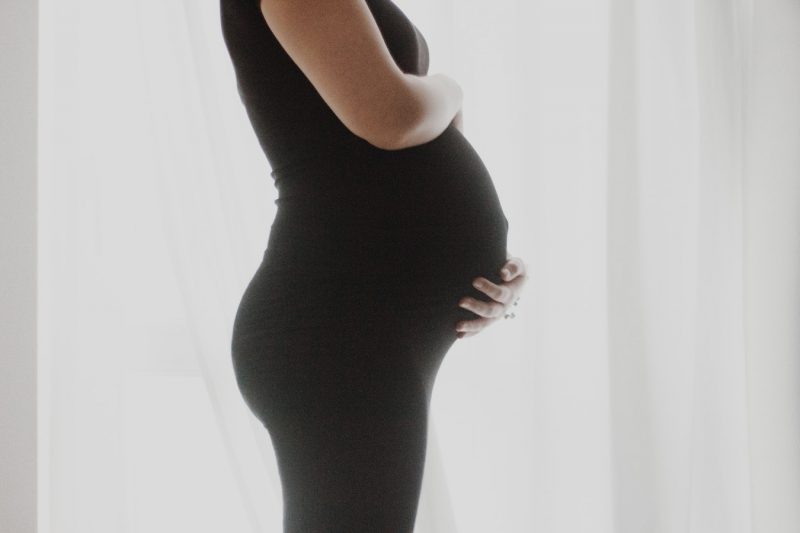
Gum disease and pregnancy
If gum disease becomes severe, the infection can affect an unborn baby’s development. Severe gum disease in an expectant mother can increase the risk of premature birth and of delivering a low birth weight baby. Signs of gum disease include:
- bleeding gums
- red gums (instead of pink)
- swollen gums
- bad breath.
Prevention:
- Brush twice a day and floss before you go to bed to avoid plaque build-up. Gingivitis is most common during the second to eighth months of pregnancy.
Morning sickness, vomiting and acid reflux
Pregnant women who experience morning sickness with vomiting and/or acid reflux are at high risk of tooth erosion*.
To reduce risk of tooth erosion and damage to your teeth after vomiting/reflux you can:
- Rinse your mouth immediately with water or a mouth rinse. (e.g. Add a teaspoon of baking soda (sodium bicarbonate) to a cup of water to rinse and spit after vomiting)
- Chew sugar free gum to stimulate saliva to neutralise and wash away acid.
- Smear a little bit of toothpaste over your teeth with your finger.
- Wait at least 30 minutes before brushing to avoid damaging softened enamel surface.
For further advice, speak to your dentist or an oral health professional.
* Tooth erosion is the gradual wearing away or dissolving of the outer enamel layer of your teeth.
Could gingivitis affect my baby’s health?
New research suggests a link between pre-term, low birth weight babies and gingivitis. Excessive bacteria, which causes gingivitis, can enter the blood stream through your mouth (gums). If this happens, the bacteria can travel to the uterus, triggering the production of chemicals called ‘prostaglandin’, which are suspected to induce premature labour.
FAQ ON PREGNANCY AND DENTISTRY
Will pregnancy affect my oral health?
Expectant mothers (and women who take some oral contraceptives) experience-elevated levels of the hormones estrogen and progesterone. This causes the gums to react differently to the bacteria found in plaque, and in many cases can cause a condition known as ‘pregnancy gingivitis’ 65 to 70% of all pregnant women developed gingivitis during this time! Symptoms including swollen, red gums and bleeding of the gums when you brush.
Pregnancy gingivitis usually starts around the second month of pregnancy and decreases during the ninth month. If you already have gingivitis, it will most likely get worse during pregnancy. Remember that the bacteria in plaque (not hormones) are what cause gingivitis. Brush twice a day and floss before you go to bed to avoid plaque build-up. Gingivitis is most common during the second to eighth months of pregnancy.
What are “pregnancy tumours”?
Pregnancy tumours (pyogenic granuloma) are inflammatory, benign growths that develop on the gums as part of an exaggerated response to the irritants that cause periodontal disease. These ‘tumours’ are rare, usually painless and develop on your gums in response to plaque. Although they are not cancerous, they should be treated. Pregnancy tumours usually subside shortly after childbirth.
Should I receive dental treatment while I’m pregnant?
Dentists recommend that major dental treatments that aren’t urgent be postponed until after your child is born. The first trimester, the stage of pregnancy in which most of the baby’’ organs are formed, is the most crucial to your baby’’ development, so it is best to have procedures performed during the second trimester to minimise any potential risk.
If I do need treatment, what drugs are safe?
If you need to have dental work done during your pregnancy, research has shown that some acceptable antibiotics include penicillin, amoxicillin and clindamycin but avoid tetracycline, which can cause discoloration of your child’s temporary and permanent teeth.
What if I’m hungry between meals?
During pregnancy, many women have the desire to eat between meals. While this is a normal urge, frequent snacking on carbohydrate-containing foods can be an invitation to tooth decay. The decay process begins with plaque, an invisible sticky layer of harmful bacteria that constantly forms on the teeth. The bacteria convert sugar and starch that remain in the mouth to acid that attacks tooth enamel. The longer sugars are retained in your mouth, the longer the acids attack. After repeated attacks, tooth decay can result.
Eat nutritious, well-balanced meals made up of foods from the five major food groups: bread cereals and other grains; fruits; vegetables; meat; fish; poultry and protein alternatives and more yoghurt and cheese. Try to resist the urge to snack constantly. When you need a snack, choose foods that are nutritious for you and your baby such as raw fruits and vegetables and dairy products.

What can I do to keep my mouth healthy during pregnancy?
To help prevent tooth decay and periodontal disease, brush your teeth thoroughly twice a day with fluoride toothpaste to remove plaque. Be sure to clean between your teeth daily with dental floss or interdental cleaners.
What if I’m pregnant and need a dental x-ray?
As a general rule we attempt to avoid x-rays and treatment requiring x-rays until after the baby is born. However, an x-ray may be needed for dental treatment or a dental emergency that can’t wait until after the baby is born. Untreated dental infections can pose a risk to the foetus, and dental treatment may be necessary to maintain the health of the mother and child. Radiation from dental x-rays is extremely low. However, every precaution is taken to minimise radiation exposure. A lead apron minimises exposure to the abdomen and should be used when any dental x-ray is taken.

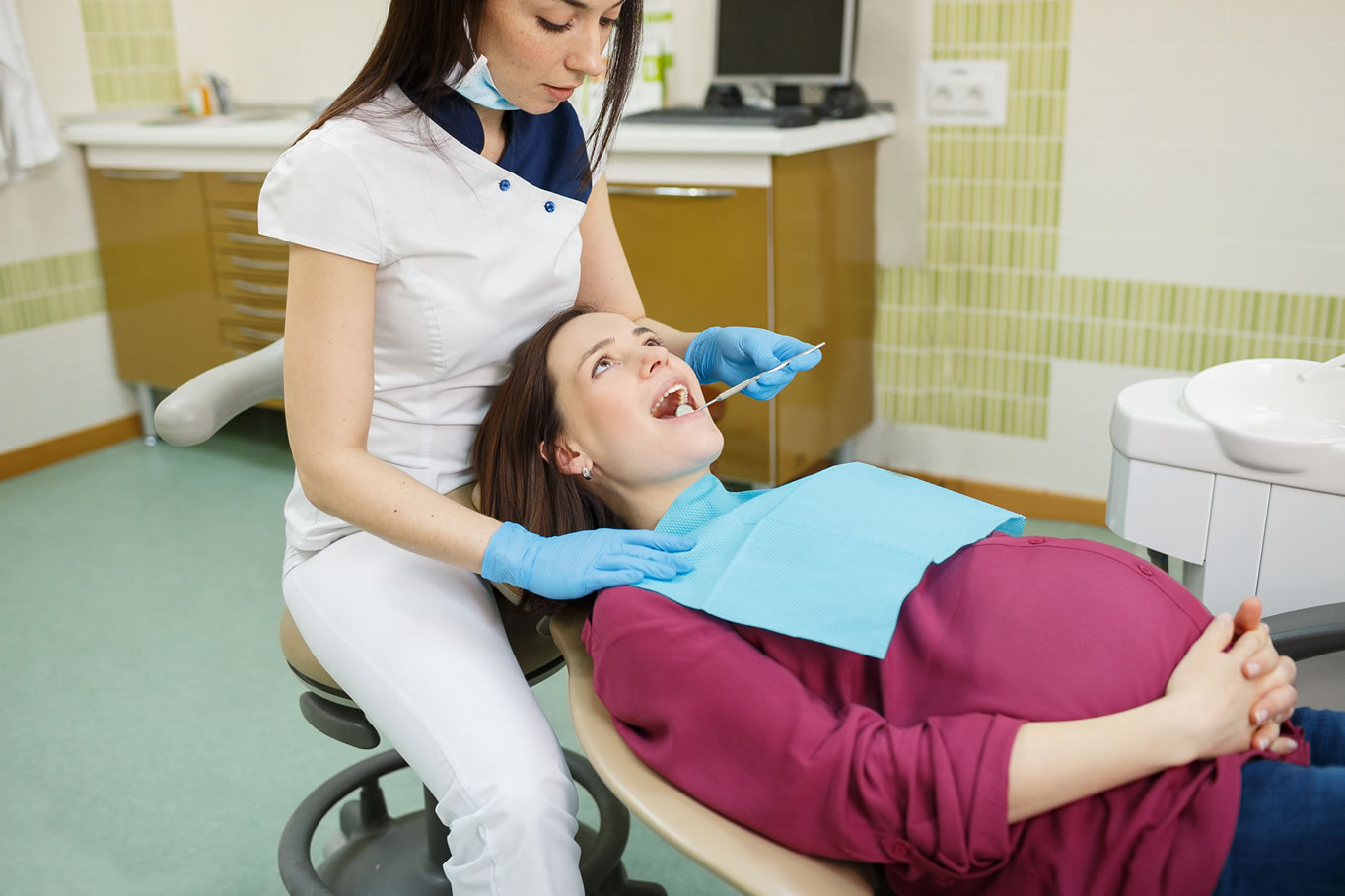
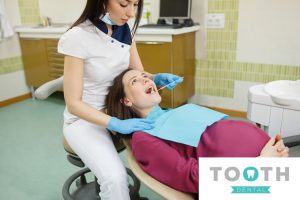 Congratulations, there is so much to organise over the next 9 months. Between doctor’s visits, setting up the nursery and cooing over tiny shoes – it is important to schedule a trip to the dentist, ideally in the second trimester. Which dental treatments are safe when you’re pregnant? Read on to learn more.
Congratulations, there is so much to organise over the next 9 months. Between doctor’s visits, setting up the nursery and cooing over tiny shoes – it is important to schedule a trip to the dentist, ideally in the second trimester. Which dental treatments are safe when you’re pregnant? Read on to learn more. 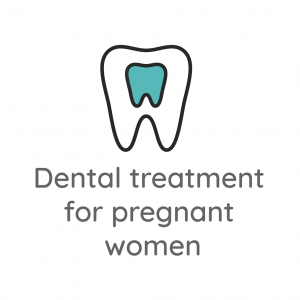 While we tend to postpone routine x-rays during pregnancy, they may be needed for treatment (root canal for example) and are quite safe. Digital Dental x-rays have the lowest radiation of any medical x-ray, and the risk can be further reduced by use of a lead apron. It is far better to get a correct diagnosis and treatment by taking an x-ray, than leave an expecting mother with painful infection in her mouth. An infection may have a greater effect on bubs development than an xray.
While we tend to postpone routine x-rays during pregnancy, they may be needed for treatment (root canal for example) and are quite safe. Digital Dental x-rays have the lowest radiation of any medical x-ray, and the risk can be further reduced by use of a lead apron. It is far better to get a correct diagnosis and treatment by taking an x-ray, than leave an expecting mother with painful infection in her mouth. An infection may have a greater effect on bubs development than an xray.